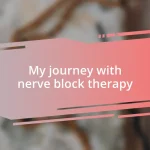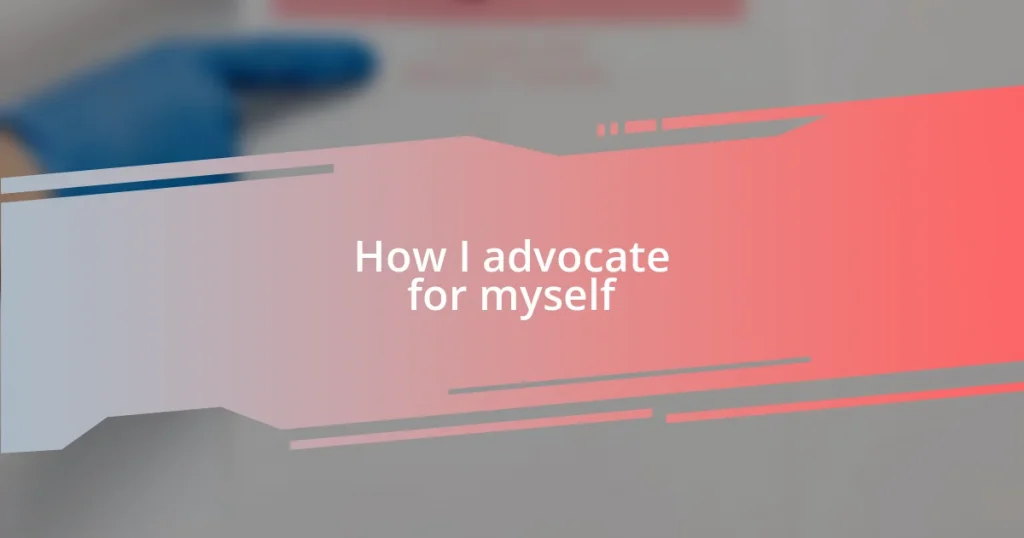Key takeaways:
- Self-advocacy involves recognizing and expressing your needs, which is crucial for a healthier work and personal environment.
- Building confidence to speak up comes from practice in supportive settings and reflecting on past achievements.
- Setting boundaries and finding supportive resources enhances your ability to advocate for yourself effectively.
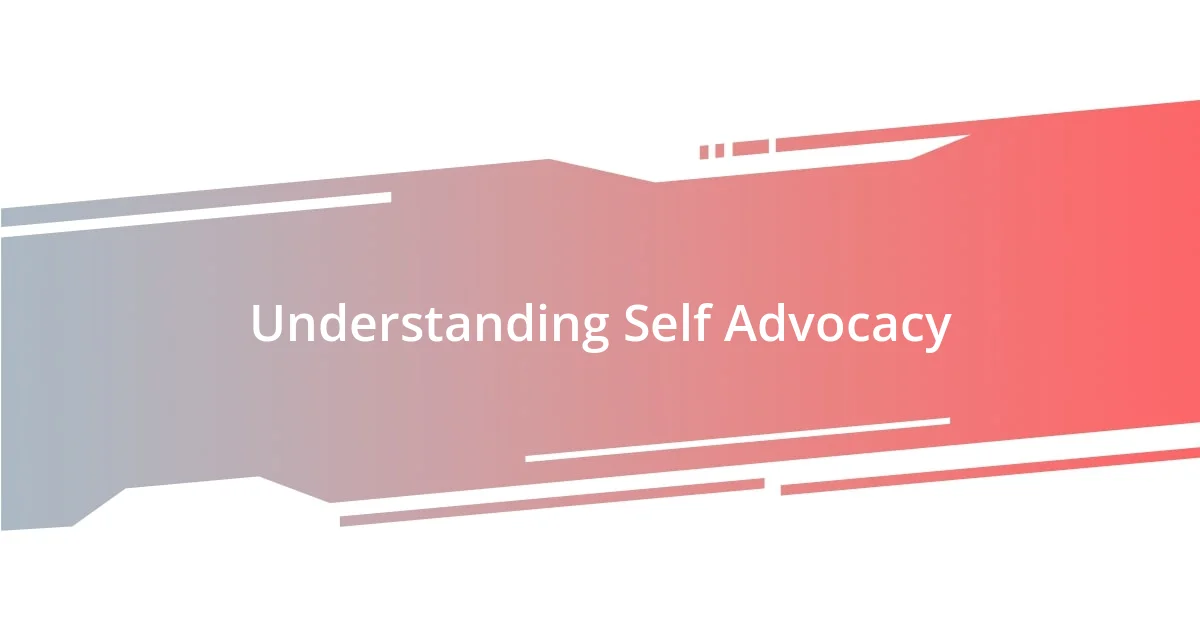
Understanding Self Advocacy
Self-advocacy is about recognizing your own needs and firmly expressing them, which I’ve found can be quite empowering. For instance, I remember a time when I didn’t speak up during a team meeting about my workload. The stress of unshared responsibilities piled up, and it wasn’t until I voiced my concerns that I realized how talking about my needs could lead to a healthier work environment.
Understanding self-advocacy also means being aware of your rights and the support systems available to you. When I was navigating a challenging health issue, I learned how essential it was to articulate what I needed from healthcare providers. I often wonder, why do we hesitate to ask for help? For me, it became clear that asking questions and seeking clarification not only empowers me but also enhances collaboration with those around me.
Beyond just speaking up, self-advocacy is about believing you deserve to be heard. I had a moment where a friend reminded me to trust my voice, which led me to assert my opinions during a family discussion. That lift in confidence was incredible! It’s what drives me to encourage others—how can you advocate for yourself if you don’t believe it’s important?
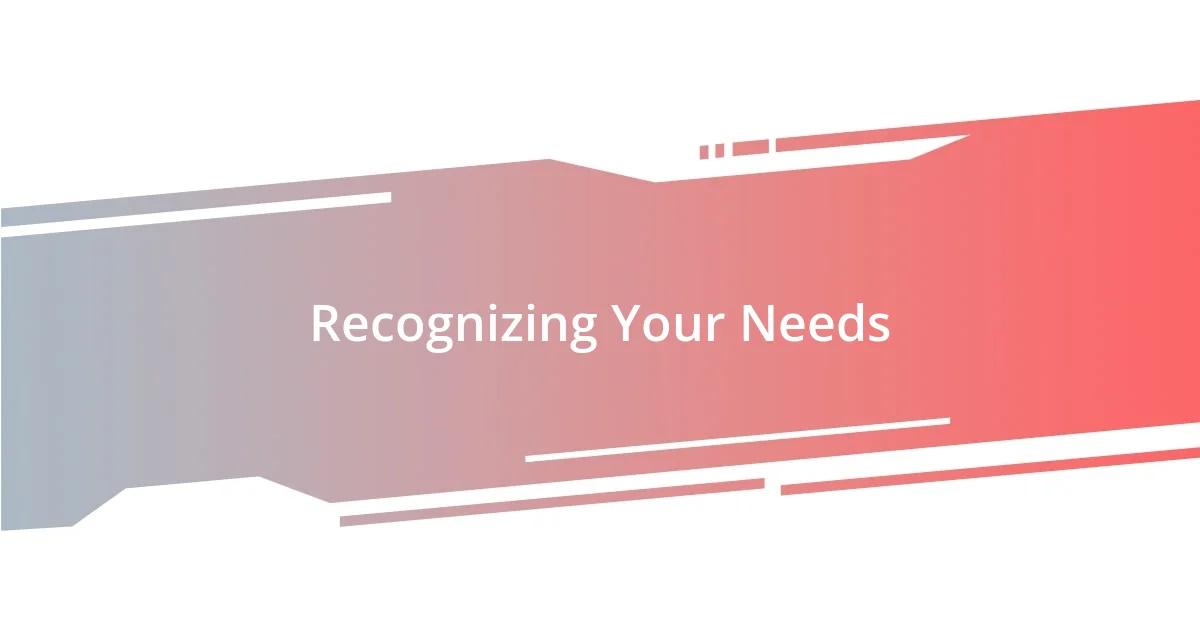
Recognizing Your Needs
Recognizing your needs can often feel like navigating a complex maze. I vividly remember a moment during my university days when I was overwhelmed with assignments. Instead of pushing through alone, I finally took a deep breath and reached out to my professor for an extension. The relief I felt was immediate; it highlighted the importance of listening to yourself. You truly can’t thrive if you’re constantly silencing your needs.
To get in touch with your needs, consider reflecting on your feelings and thoughts. Here are some strategies that have helped me:
- Journal regularly: Writing down your thoughts can reveal patterns about what you might be neglecting.
- Check in with yourself: Pause and ask, “What do I need right now? Am I feeling stressed, tired, or maybe overwhelmed?”
- Talk it out: Sometimes, just vocalizing your feelings to a friend can clarify what you really need.
- Emotional awareness: Notice when your feelings shift; they often signal unmet needs that require attention.
Taking these steps can help you better recognize and understand what you truly require to lead a fulfilling life.
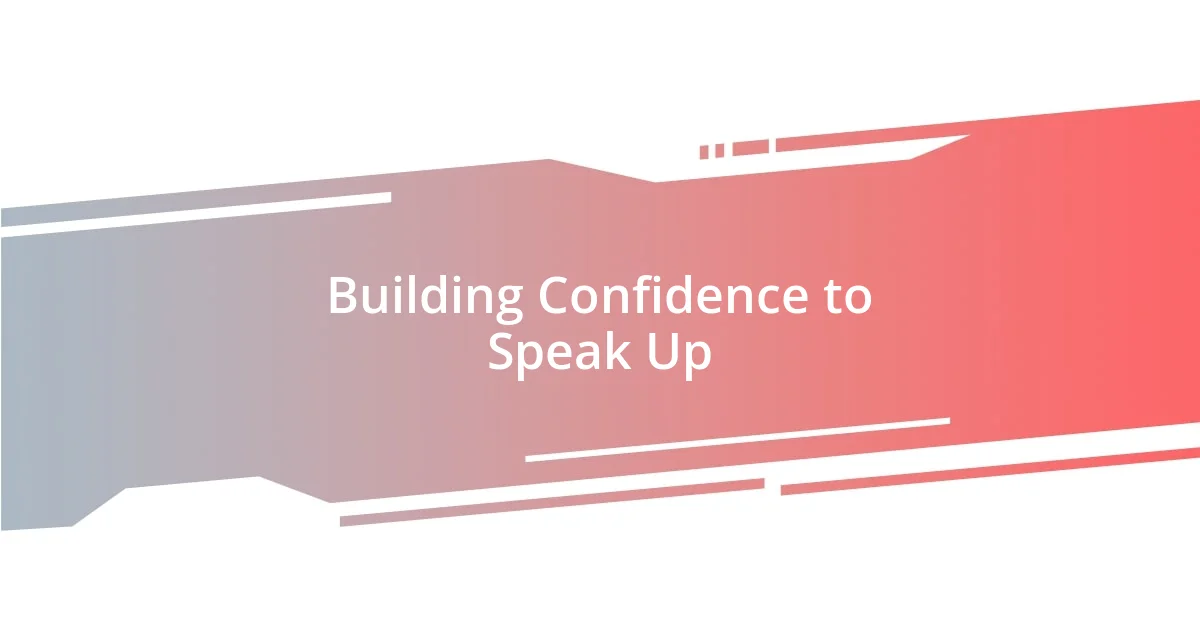
Building Confidence to Speak Up
Building confidence to speak up is something I’ve grappled with over the years. A vivid memory stands out—there was a time when I was hesitant to share my project ideas during a brainstorming session. I felt that my thoughts weren’t as polished as others’. However, after finally voicing my idea, I noticed how it sparked a meaningful discussion. That moment taught me that speaking up not only adds value but also enriches the collective dialogue. Isn’t it fascinating how our perspectives can shift the conversation?
Another crucial piece of building confidence is practicing in safe environments. I remember joining a local speaking club, which was previously intimidating. However, with each meeting, I grew more comfortable sharing my thoughts. The supportive feedback helped me recognize my strengths and areas for growth. This practice mirrored a realization I had: confidence builds with experience. How often do we underestimate our ability to improve by just taking that first step?
It’s also important to remind ourselves of our achievements. I’ve taken time to list past successes—no matter how small. This exercise feels empowering; it puts me in a positive mindset when preparing to advocate for myself. Reflecting on how I’ve successfully navigated challenges reassures me that I can face new ones. Have you ever tried this? If not, I encourage you to give it a shot!
| Strategy | Description |
|---|---|
| Share Ideas | Express your thoughts in group settings to encourage dialogue. |
| Practice Speaking | Join clubs or groups to enhance your communication skills in a supportive environment. |
| Reflect on Achievements | List past successes to boost confidence when advocating for yourself. |
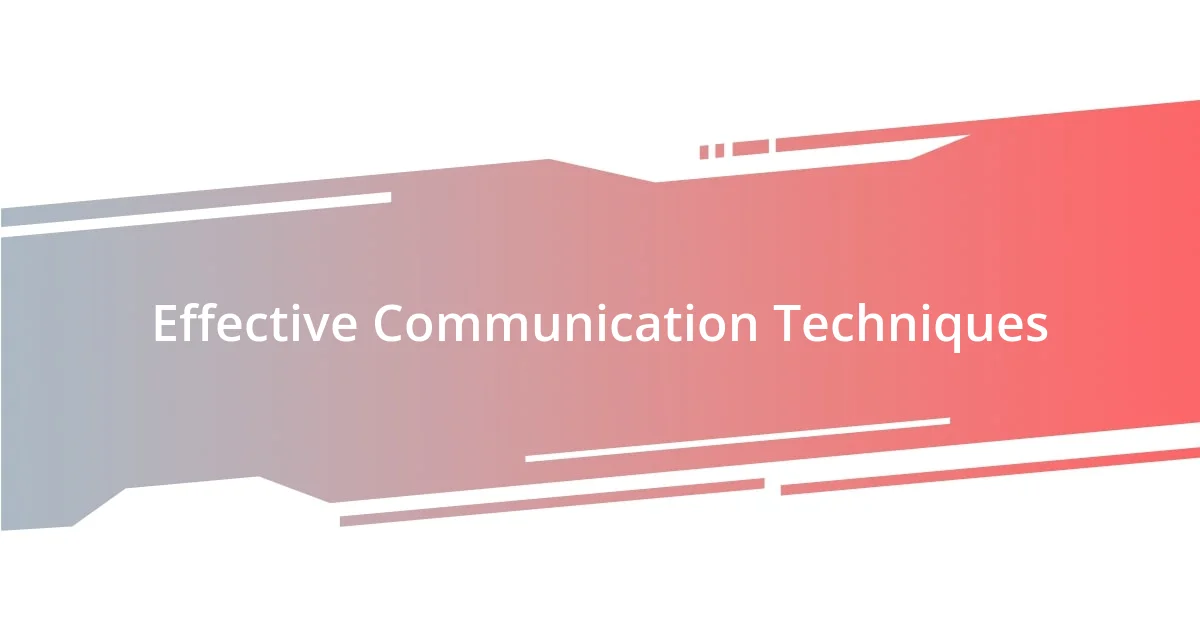
Effective Communication Techniques
Effective communication techniques are essential to ensure your voice is heard, especially when advocating for yourself. I recall a time during a team meeting when I felt my ideas were being overlooked. Instead of remaining silent, I made a conscious decision to assertively restate my points with clarity and emphasis. It was a moment of realization: how we phrase our thoughts can make a monumental difference in how they’re received. Have you ever felt your message was lost in translation? Rephrasing your statements for clarity can help bridge that gap.
Active listening plays a pivotal role too. I remember a conversation I had with a coworker who was going through a tough time. By genuinely focusing on what they were saying, I not only showed my support but also discovered ways to articulate my own thoughts more effectively. I often ask myself, “Am I truly listening, or am I just waiting for my turn to speak?” This self-awareness ensures that my responses are thoughtful and relevant to the discussion, which naturally fosters better communication.
Non-verbal cues can enhance the message I convey, so I pay attention to my body language. When I’m passionate about a topic, my gestures tend to become animated, and I notice that it captures attention. Have you ever noticed how a simple nod can motivate someone to share more? Positive body language not only reinforces my words but also encourages others to engage, creating a more dynamic dialogue. Remember, effective communication isn’t just about speaking; it’s also about how you present yourself and connect with others.
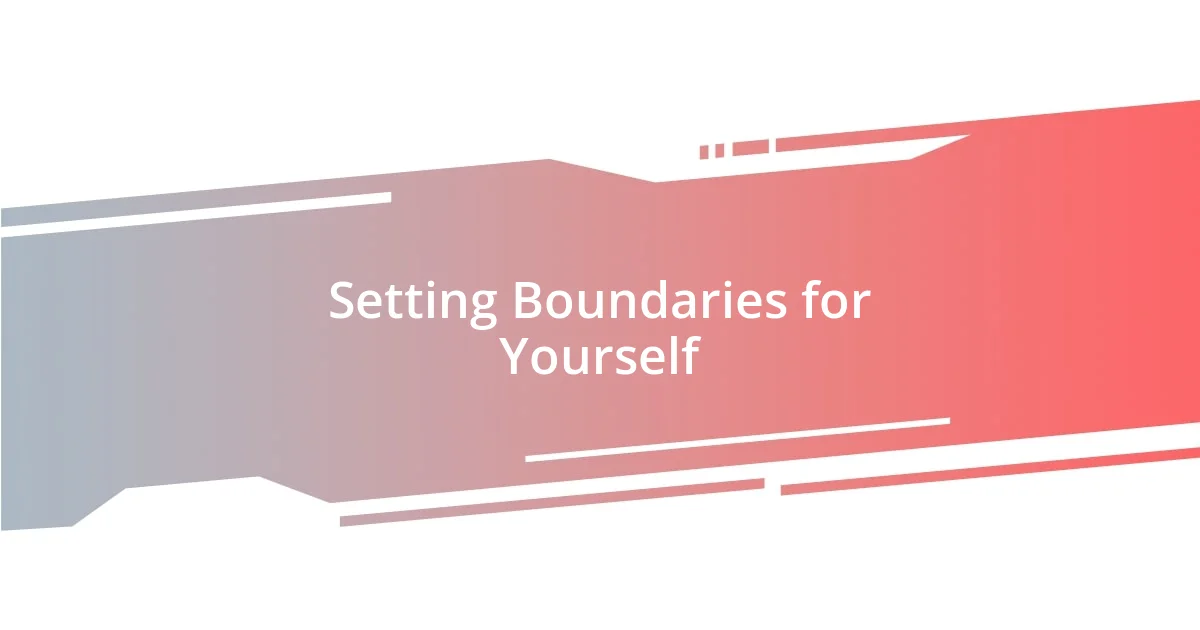
Setting Boundaries for Yourself
Setting boundaries is a fundamental aspect of advocating for myself. I vividly recall a time when I realized the need to say “no” more often. I had taken on too many projects at work, thinking it would impress my boss. Instead, I felt overwhelmed and stressed. By deciding to set limits on what I could handle, I discovered a newfound sense of control in my life. Have you ever felt like you were juggling too much? Learning to set boundaries can liberate you from those crushing expectations.
Sometimes, people around us don’t understand our limits unless we express them clearly. I once had a friend who would often call me late at night, wanting to chat about everything under the sun. It wasn’t that I didn’t want to help; I simply needed my rest. So, I gently explained that I could only talk during certain hours. It was tough to speak up initially, but once I did, I noticed a shift. It not only improved my sleep but also strengthened our friendship by fostering mutual respect for each other’s time. Isn’t it incredible how sharing our boundaries can enhance relationships?
Creating space for my boundaries has also opened doors for self-reflection. I remember setting aside time each week to evaluate my commitments and reassess how they align with my priorities. This practice taught me that being busy doesn’t equate to being productive. Instead, it’s essential to focus on what truly matters to me. When did you last take a moment to prioritize your needs? It’s a game-changer that can lead you towards a more fulfilling life.
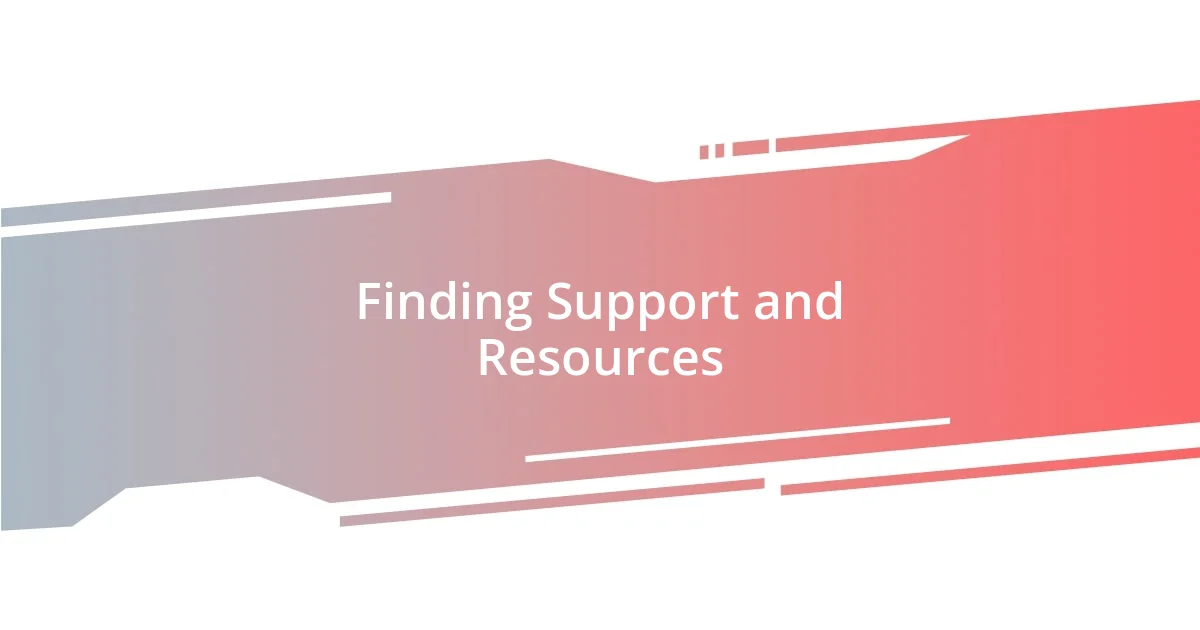
Finding Support and Resources
Finding the right support and resources can significantly enhance your self-advocacy journey. I remember discovering a local support group that focused on personal development. Walking into that room for the first time, I was met with warmth and understanding. Have you ever felt an instant connection with people who just get you? Sharing experiences there opened my eyes to new strategies and perspectives, proving that collaboration can be a powerful ally in advocating for myself.
It’s vital to seek out resources that resonate with your unique situation. I once stumbled upon a fantastic online forum filled with like-minded individuals facing similar challenges. Engaging with them helped me realize I wasn’t alone in my struggles. Have you ever felt overwhelmed by a decision, only to find that others have navigated the same waters? Their shared stories and advice became a treasure trove of encouragement and insight, reinforcing my journey toward self-advocacy.
Don’t underestimate the value of mentors and allies in your corner. I had the privilege of working with a colleague who always believed in my potential. Her steady encouragement fueled my confidence to voice my ideas assertively. Isn’t it amazing how one person can alter the trajectory of your self-advocacy journey? Having someone to turn to for guidance can transform your efforts into a thriving support network.
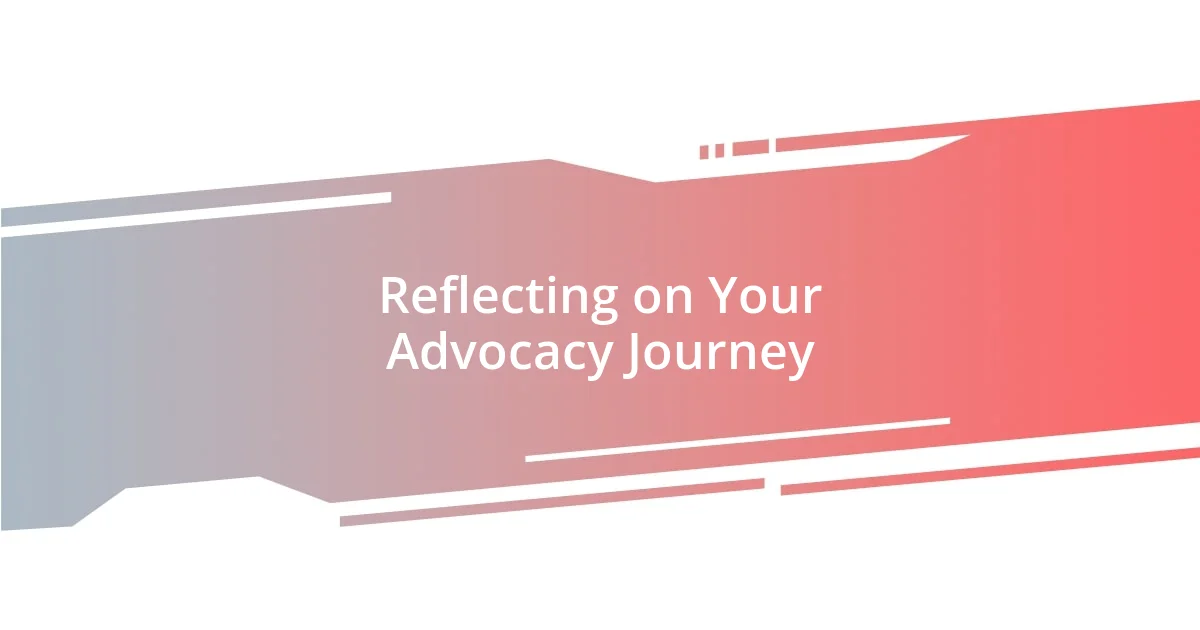
Reflecting on Your Advocacy Journey
Reflecting on my advocacy journey has been a process of discovery and growth. I often think back to the moments when I hesitated to speak up—like that time in a team meeting when I felt my idea was dismissed. I remember the knot in my stomach, feeling invisible. But with time, I realized that sharing my perspective not only validated my own ideas but also contributed to the group’s success. How can we expect to be heard if we don’t take the step to voice our thoughts?
As I ponder my experiences, I see how each step, even the missteps, has shaped my confidence. There was a time when I felt guilty for taking a break after a long day, convinced I had to push through fatigue. It hit me during a particularly draining week when I caught myself resenting commitments rather than enjoying them. Taking a step back allowed me to recharge and approach my advocacy with a refreshed mindset. Have you ever experienced a turning point that made you reevaluate your habits? Embracing those reflective pauses can illuminate so much about our needs.
Reflecting also means recognizing the victories, however small. I recall celebrating the day I effectively communicated my aspirations to a mentor, a moment that felt monumental in my journey. It wasn’t just about reporting my goals; it was about claiming my space at the table. That conversation opened doors I didn’t even know existed. What are the moments that make you proud along your journey? Acknowledging these victories not only boosts our self-esteem but also reinforces our commitment to advocate for ourselves.








